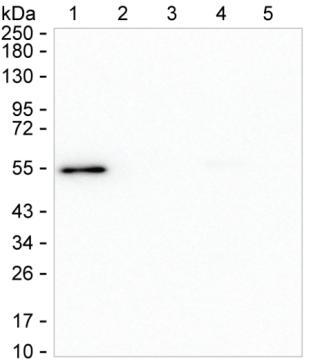
| WB | 咨询技术 | Human,Mouse,Rat |
| IF | 咨询技术 | Human,Mouse,Rat |
| IHC | 咨询技术 | Human,Mouse,Rat |
| ICC | 1/50-1/200 | Human,Mouse,Rat |
| FCM | 咨询技术 | Human,Mouse,Rat |
| Elisa | 咨询技术 | Human,Mouse,Rat |
| Host/Isotype | Mouse IgG1 |
| Antibody Type | Primary antibody |
| Storage | Store at 4°C short term. Aliquot and store at -20°C long term. Avoid freeze/thaw cycles. |
| Species Reactivity | Rat |
| Immunogen | Rat IgG2a |
| Formulation | Purified antibody in PBS with 0.05% sodium azide |
+ +
以下是关于ABCB5抗体的3篇代表性文献及其摘要概括:
---
1. **文献名称**:*ABCB5 identifies immunoregulatory dermal cells*
**作者**:Schatton T, et al.
**摘要**:该研究通过ABCB5特异性抗体证实,ABCB5在黑色素瘤起始细胞和正常皮肤免疫调节细胞中高表达,提示其可作为癌症干细胞标记物及免疫治疗潜在靶点。
---
2. **文献名称**:*ABCB5 maintains melanoma-initiating cells through a pro-inflammatory cytokine signaling circuit*
**作者**:Wilson BJ, et al.
**摘要**:利用ABCB5抗体阻断实验,发现ABCB5通过调控IL-1β/IL-8炎症信号通路促进黑色素瘤干细胞自我更新,为靶向ABCB5的抗体疗法提供了机制依据。
---
3. **文献名称**:*ABCB5 expression in colorectal cancer and its association with tumor progression*
**作者**:Keshel SH, et al.
**摘要**:通过免疫组化分析结直肠癌组织,发现ABCB5抗体检测的高表达与患者预后不良及化疗耐药显著相关,提示其作为预后生物标志物的潜力。
---
以上文献展示了ABCB5抗体在癌症干细胞识别、靶向治疗机制研究及临床预后评估中的关键作用。
ABCB5. a member of the ATP-binding cassette (ABC) transporter superfamily, is a transmembrane protein initially identified as a marker of chemoresistant cancer stem cells (CSCs) in melanoma. It functions as a drug efflux pump, contributing to multidrug resistance (MDR) by expelling chemotherapeutic agents from cells, thereby reducing treatment efficacy. Beyond its role in oncology, ABCB5 is expressed in normal tissues, including skin, ocular epithelium, and immune cells, where it regulates progenitor cell differentiation, tissue repair, and immune modulation.
ABCB5-specific antibodies, such as monoclonal antibodies (mAbs), were developed to target and inhibit its pump activity or to label ABCB5+ cells for research and diagnostic purposes. These antibodies have become critical tools in studying CSC biology, tumor heterogeneity, and mechanisms underlying therapy resistance. Preclinical studies demonstrate that blocking ABCB5 with antibodies sensitizes resistant cancer cells to chemotherapy, suppresses tumor growth, and enhances immune checkpoint inhibitor responses.
Clinically, ABCB5 antibodies are explored as therapeutic agents in phase I/II trials for advanced melanoma and other solid tumors. They also hold diagnostic potential, as ABCB5 expression correlates with poor prognosis in cancers like colorectal carcinoma and glioblastoma. Additionally, ABCB5 antibodies aid in isolating regenerative stem cells for wound healing and corneal repair applications. Ongoing research aims to optimize antibody-based strategies to overcome MDR and improve outcomes in precision oncology and regenerative medicine.
×